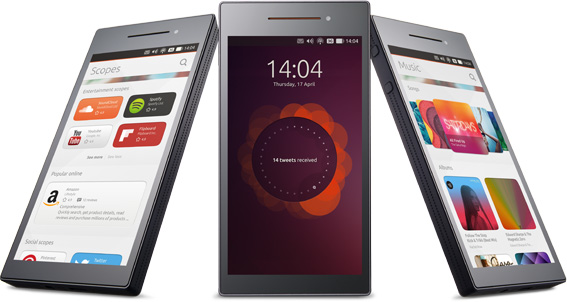The first Ubuntu phone

When Canonical unveiled its Ubuntu Edge concept phone on Indiegogo a couple of years ago, two things were clear: the ludicrously high funding goal showed that Canonical’s main goal was to generate hype rather than funds, and the company was taking a more aggressive approach to give Linux some mainstream appeal.
If Ubuntu was treading water in the desktop space, maybe it could do a lap or two in the mobile market? The Edge didn’t meet its funding goal, but next week — two years after the concept was revealed — the first Ubuntu mobile phone will go on sale
Around one year ago — almost to date — we learned that Canonical managed to wrangle a couple of partners to help manufacture Ubuntu mobile phones, Meizu and BQ Readers. Since then, though, what we mostly heard was silence. Next week, BQ will be able to say it sold the world’s first Ubuntu smartphone. Canonical’s mobile OS will be placed on BQ’s Aquaris E4.5, traditionally a midrange Android phone, sporting a 1.3GHz quad-core Cortex A7 processor, 1GB of RAM, 8GB of internal storage, and a micro SD card slot packed underneath a 4.5-inch 540×960 display, alongside a 8MP rear camera and 5MP front camera. There’s no LTE compatibility, but the phone does have two micro SIM slots. It’s not exactly the Ubuntu Edge, which promised to be a super phone that can morphfrom mobile to a full desktop environment, but for Canonical — at least at this stage — it’ll do. It’s clear that Canonical is simply testing the market with as little risk as possible, and seeing how big of a draw the unique Ubuntu mobile experience will be.
Canonical and BQ plan to generate hype not through the midrange specs, but through exclusivity. Not only will this be the only purchasable Ubuntu smartphone for now, but it will initially be sold through online flash sales, creating an air of urgency — and if you’ve been clamoring for an Ubuntu mobile device since the failed Edge campaign, you’re out of luck if you’re out of Europe. Canonical, at least, is working on a strategy to make the phone available in US markets, but there isn’t a definitive timeframe.
If you’re in Europe, you’ll have to keep an eye on both Canonical and BQ, as the flash sales seem to be just that — a flash. If you’re invested in the mobile Ubuntu alternative, hope that your European brethren gobble up the phones and help build a viable market.

Comments
Post a Comment